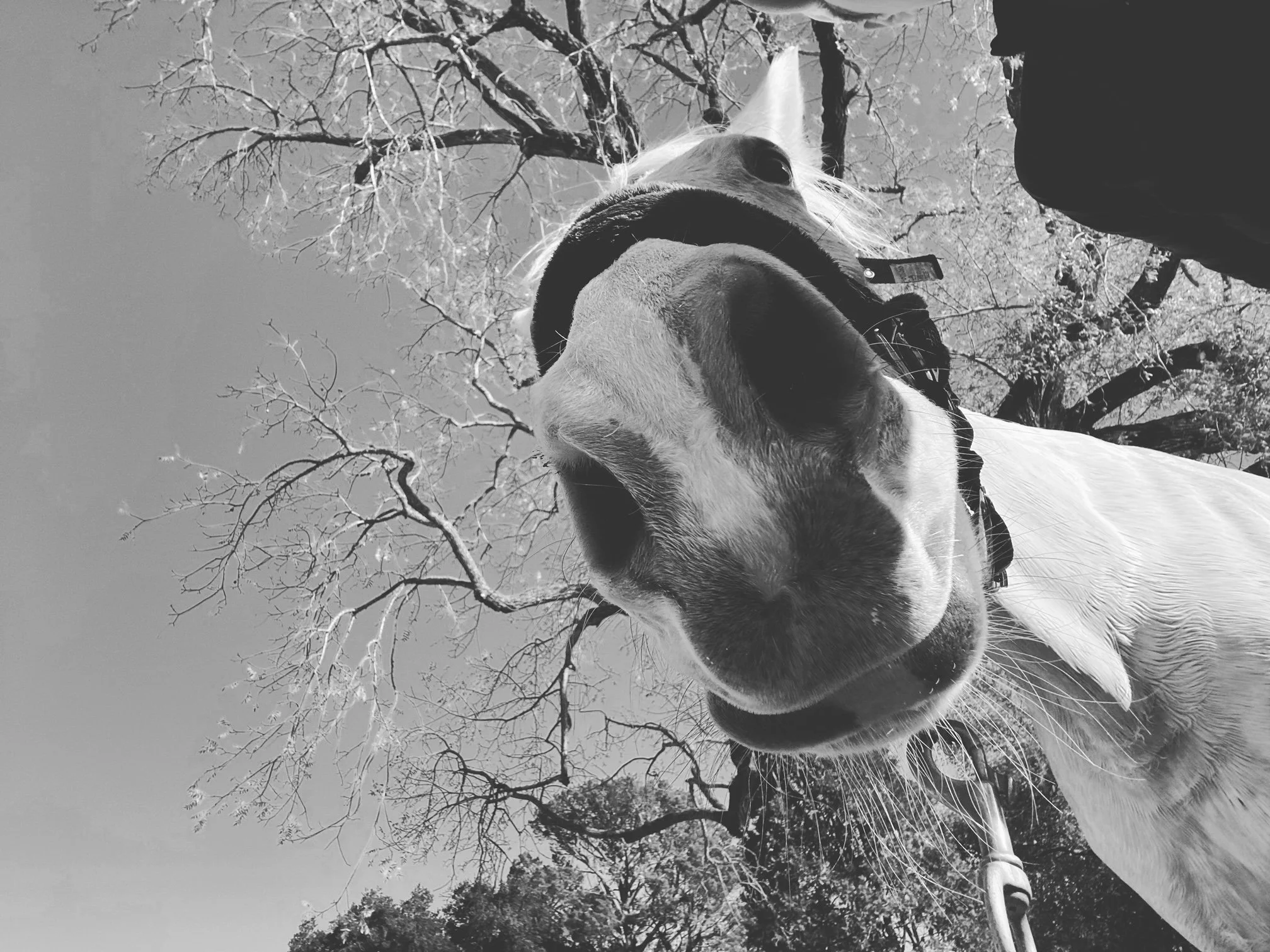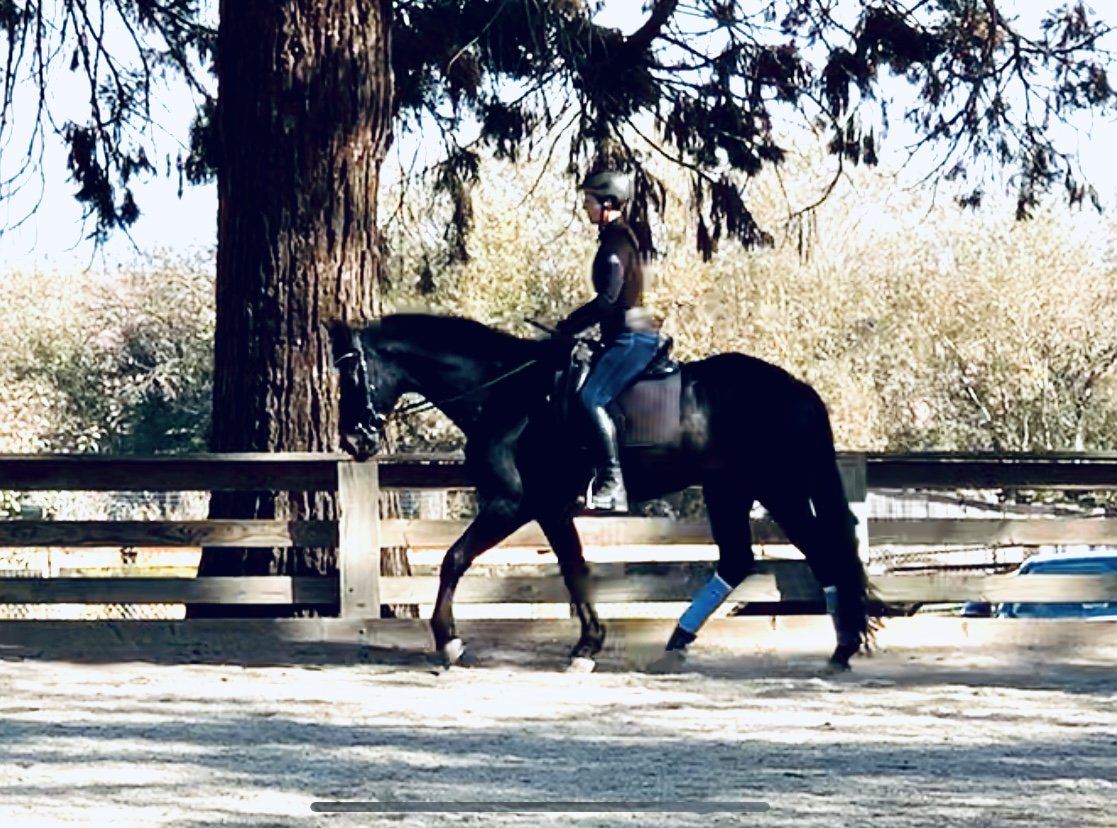Relationship Advice or How You Show Up
I’ve recently been working with a horse who has shown some undesirable behaviors from the rider’s point of view, or, from the horse’s point of view, communication about not enjoying and not being invested in the process. (Physical problems had been ruled out to the extent possible).
I’ve shown up to work with this mare with one over-arching goal: to convince her that there’s something in it for her if she started working with me. Namely: that this work is going to feel great to her, that she’ll be more balanced and supple, and it’ll get her lots of praise. No punishment. Praise for the slightest attempts, re-directs for anything else… LOTS of redirecting. And a genuine interest in understanding why she objects.
She wasn’t really into it. While we made progress with some exercises (also with the help of the owner as a ground person), she had no interest in connecting with me on a personal level. After about a month, she put her nose to my nose and was breathing intently. That was the first sign that at least I had peeked her curiosity.
We then finally had some rain storms here in drought-stricken Northern California. And on a ride between storms, she was both a bit full of herself AND insecure. To be fair, there are a lot of inhabitants in the bushes next to the ring, from deer to turkey to quail…. I focused on my breath and on keeping both her feet and her mind engaged (and balanced). I had no expectations of actually getting a productive “dressage” ride but rather thought of it as an opportunity to work through a situation we’d surely encounter more often: plenty of distractions, yet she’ll be asked to focus on her rider. I would have called anything a success that didn’t involve me kissing the ground.
And this is when some sort of cosmic shift in our relationship took place. She made the decision that she would put energy and effort into working with me. And she did some of the best (and most relaxed) canter work and leg yields she’s done to date – toward the scary bushes at that (!) - and was able to stretch all the way to the buckle.
This is one of those rides I’ll never forget. It’s a an enormous loan of trust on her part that now is my responsibility to keep building on. I want to be really clear that it was her decision to invest in this process, to accept my offer. And that has far more to do with the way I show up as person and rider than technique (beyond meeting the standard of not confusing or unbalancing the horse).
It turns out that the relationship with your horse doesn’t look all that different (of course the horse’s physiological and psychological needs being met is a prerequisite) than hallmarks of healthy human to human relationships. Here are some of the main ingredients (according to Betterhelp.com):
Respect
Respect does not equal obedience. A horse crowding you may not respect your space, but a punishing reaction on your part is not respecting him as a full, conscious being. Respect is your understanding of your horse’s needs and communication. Respect is not taking his behavior personally.
Trust
Trust is built over time. And it is far more easily lost than built. It’s showing up authentically with your horse’s best interest always in mind. It’s knowing when you’re in over your head and getting help. It’s working on yourself.
Effective Communication
Be fully present. Be clear in your mind about what you are asking and with your intentions. When riding, you must be able to have an independent seat. If you don’t have it yet, put every effort into developing it on and off the horse. You can’t truly work with your horse from the saddle until you have it.
Friendship
Treat your horse like you treat your best friend. Take time to spend time together not only for exercise. Especially those who have horses in full training that are already groomed and tacked up for your lessons, figure out times when you can do this yourself.
Commitment
Horses are not a hobby. Horses require enormous commitments in terms of time, money, energy, love, desire to self-improve, humility, and yes, a bit of obsession.
Flexibility
You need to be able to adjust your plans according to your horse’s needs, attitude, ability, willingness which can be slightly different each day. This goes for training and show plans as much as for unplanned situations. Respond to what is, not to what was yesterday or what you think “should” be the case.
If there’s one thing I’d want all of us to take to heart, it’s: When you know better, do better. Let the new year be a nudge to become a better version of ourselves, for our horses.
Photo: That’s my friend Shiloh, a relationship that’s been nurtured for several years.





